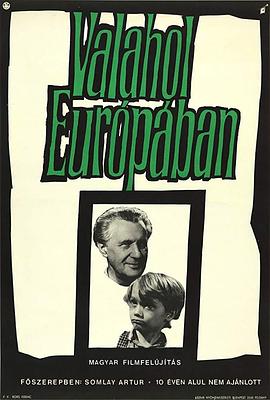Somewhere in the remote region, the war ends. In the midst of ruined cities and houses in the streets, in rural hamlets, everywhere where people still live, are children who have lost their homes and parents. Abandoned, hungry, and in rags, defenseless and humiliated, they wander through the world. Hunger drives them. Little streams of orphans merge into a river which rushes forward and submerges everything in its path. The children do not know any feeling; they know only the world of their enemies. They fight, steal, struggle for a mouthful of food, and violence is merely a means to get it. A gang led by Cahoun finds a refuge in an abandoned castle and encounters an old composer who has voluntarily retired into solitude from a world of hatred, treason, and crime. How can they find a common ground, how can they become mutual friends The castle becomes their hiding place but possibly it will also be their first home which they may organize and must defend. But even for this, the price will be very high. To this simple story, the journalist, writer, poet, scriptwriter, movie director, and film theoretician Béla Balázs applied many years of experience. He and the director Géza Radványi created a work which opened a new postwar chapter in Hungarian film. Surprisingly, this film has not lost any of its impact over the years, especially on a profound philosophical level. That is to say, it is not merely a movie about war; it is not important in what location and in what period of time it takes place. It is a story outside of time about the joyless fate of children who pay dearly for the cruel war games of adults. At the time it was premiered, the movie was enthusiastically received by the critics. The main roles were taken by streetwise boys of a children's group who created their roles improvisationally in close contact with a few professional actors, and in the children's acting their own fresh experience of war's turmoil appears to be reflected. At the same time, their performance fits admirably into the mosaic of a very complex movie language. Balázs's influence revealed itself, above all, in the introductory sequences an air raid on an amusement park, seen in a montage of dramatic situations evoking the last spasms of war, where, undoubtedly, we discern the influence of classical Soviet cinematography. Shooting, the boy's escape, the locomotive's wheels, the shadows of soldiers with submachine guns, the sound of a whistle—the images are linked together in abrupt sequences in which varying shots and expressive sharp sounds are emphasized. A perfectly planned screenplay avoided all elements of sentimentality, time-worn stereotypes of wronged children, romanticism and cheap simplification. The authors succeeded in bridging the perilous dramatic abyss of the metamorphosis of a children's community. Their telling of the story (the scene of pillaging, the assault on the castle, etc) independently introduced some neorealist elements which, at that time, were being propagated in Italy by De Sica, Rossellini, and other film artists. The rebukes of contemporary critics, who called attention to formalism for its own sake have been forgotten. The masterly art of cameraman Barnabás Hegyi gives vitality to the poetic images. His angle shots of the children, his composition of scenes in the castle interior, are a living document of the times, and underline the atmosphere and the characters of the protagonists. The success of the picture was also enhanced by the musical art of composer Dénes Buday who, in tense situations, inserted the theme of the Marseilaise into the movie's structure, as a motive of community unification, as an expression of friendship and the possibility of understanding. Valahol Europaban is the first significant postwar Hungarian film. It originated in a relaxed atmosphere, replete with joy and euphoria, and it includes these elements in order to demonstrate the strength of humanism, tolerance, and friendship. It represents a general condemnation of war anywhere in the world, in any form.
爱奇艺网友:电影《欧洲的某个地方》讲述了Somewhere in the remote region, the war ends. In the midst of ruined cities and houses in the streets, in rural hamlets, everywhere where people still live, are children who have lost their homes and parents. Abandoned, hungry, and in rags,......的故事
腾讯视频网友:最近《欧洲的某个地方》上映了,没想到制作方非常地慷慨,一来就
放全集,观众们可以一口气从第一集看到大结局。这部剧中演员们的高颜值是一大亮点之外,它里面的台词也非常的搞笑啊!台词沙雕中带着可爱。
优酷视频网友:是的,目前《欧洲的某个地方》2024-04-09 04:44:46更新。具体总集数可以去
百度问答看看。
百度视频网友:除了
优酷视频视频软件之外你还可以去
爱奇艺、
芒果tv、
星辰影院、
百度视频等平台去看正版视频。
百度知道:有以下演员主演:Artúr,Somlay,Miklós,Gábor,Zsuzsa,Bánki。
芒果TV网友:最近由Artúr,Somlay,Miklós,Gábor,Zsuzsa,Bánki等演员主演的剧情片《欧洲的某个地方》一经播出就受到了很多观众的欢迎和认可,这部剧情片里面,演员的演技都是非常值得肯定的,我觉得演员Artúr,Somlay,Miklós,Gábor,Zsuzsa,Bánki他们在里面的演技都非常的好,能够去把握这个角色所要表达的情感,向观众展现出更好的作品。
哔哩哔哩网友:您可以用手机打开
百度APP在搜索框里输入:欧洲的某个地方手机在线观看免费,就可以找到免费正版播放资源了。手机免费看
《欧洲的某个地方》网址:https://www.zjqimeng.com/play-137253.html,
星辰影院这个网站免费无广告。
搜狐视频网友:很多地方都可以看呀,我是在
星辰影院APP上看的,打开APP后直接搜索“欧洲的某个地方”就能看了。
 在国外,莫名想看欧洲的某个地方,看到Artúr,Somlay,Miklós,Gábor,Zsuzsa,Bánki这个阵容本来还是有点小期待。结果,哎...很是失望,奇奇怪怪尴尴尬尬,剧情也一言难尽...虽然现在都在拍主旋律都在拍正剧,但也不能这种充数,演员和剧本还是硬功夫。什么时候我们也能拍出那种能够真正吸引人的剧呢?
在国外,莫名想看欧洲的某个地方,看到Artúr,Somlay,Miklós,Gábor,Zsuzsa,Bánki这个阵容本来还是有点小期待。结果,哎...很是失望,奇奇怪怪尴尴尬尬,剧情也一言难尽...虽然现在都在拍主旋律都在拍正剧,但也不能这种充数,演员和剧本还是硬功夫。什么时候我们也能拍出那种能够真正吸引人的剧呢? 题材大胆、现实立意深刻,抓住社会痛点,剧本扎实。其它在影视创方面的确很厉害,希望剧情片多来点这种影视剧,强烈安利大家这部《欧洲的某个地方》。
题材大胆、现实立意深刻,抓住社会痛点,剧本扎实。其它在影视创方面的确很厉害,希望剧情片多来点这种影视剧,强烈安利大家这部《欧洲的某个地方》。 《欧洲的某个地方》可太精彩了。前部分就爆了,好爽。节奏很好,有反转感,不错。期待导演Radványi,Géza后续给力点,多拍点这种片子。
《欧洲的某个地方》可太精彩了。前部分就爆了,好爽。节奏很好,有反转感,不错。期待导演Radványi,Géza后续给力点,多拍点这种片子。 Radványi,Géza拍的的《欧洲的某个地方》,从剧情风格到配色配音我本人并不太喜欢,但不得不说,会抄也是一种本事,这部电影至少比某些天马行空胡乱自创影楼装服饰满天飞的剧要好的多。
Radványi,Géza拍的的《欧洲的某个地方》,从剧情风格到配色配音我本人并不太喜欢,但不得不说,会抄也是一种本事,这部电影至少比某些天马行空胡乱自创影楼装服饰满天飞的剧要好的多。 《欧洲的某个地方》的演员表演都很自然,剧情和人物也比较合理,没有太多的刻板印象,特别是在人物塑造上非常好,尤其是演员Artúr 饰演的人物特别到位。
《欧洲的某个地方》的演员表演都很自然,剧情和人物也比较合理,没有太多的刻板印象,特别是在人物塑造上非常好,尤其是演员Artúr 饰演的人物特别到位。

